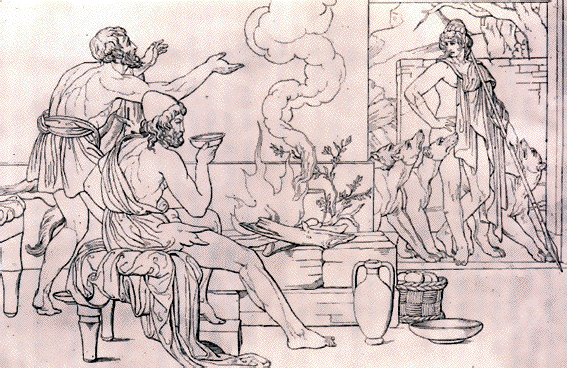
In book 13 of the Odyssey, Odysseus finds himself abandoned by his Phaeacian escort in a land which he does not recognize and with no certain way to protect the gifts he has obtained from King Alcinous. Soon met by Athena disguised as a young shepherd, Odysseus cautiously responds to his circumstances with a lie carefully constructed to explain the oddities of his situation(13.187-286). As has long been noted, his lie also serves as a warning to the shepherd; by claiming to be a fugitive who has killed a man for stealing his property, Odysseus shows himself to be capable of protecting the treasure at his feet (cf. Trahman 1952, 35-36). Yet this warning is never made explicit, as Odysseus never openly threatens the shepherd.Instead, by crafting his history to his situation, Odysseus indirectly makes his point.
As I will show, such indirect communication is a central feature of the lying tales Odysseus tells upon arriving in Ithaca, in each of which (to Eumaeus at 14.192-359 and 14.462-506; to Antinous at 17.415-444;to Amphinomus at 18.125-150;to Penelope at 19.165-307; and to Laertes at 24.244-314),Odysseus alters his persona’s history to impart information which is tailored to affect and instruct his specific audience. In particular, Odysseus uses his tales to present what Pratt has referred to as “ethical truths,”such as the mutability of fortune and the importance of proper guest-host relations (Pratt 1993, 91).

Thus one version of his history serves to reinforce the swineherd Eumaeus’ beliefs about the nature of divine justice (cf. King1999, 75-78), while a slightly altered version serves as a warning to the suitor Antinous against the violation of xenia-relations (cf. Emlyn-Jones 1986, 7). Similarly, tales which focus on earlier acts of proper social interactions, such as that told to Penelope or the ainos related to Eumaeus, encourage their listeners to engage in similar acts. Such an emphasis on proper ethical instruction can even help to explain the “test”of Laertes in book 24. In such ways,Odysseus attempts to use his tales not only as a way to win over his audience, but to instruct them on proper values as well.
This aspect of Odysseus’ tales is particularly important in light of another of their features—the tales’ similarity to poetic speech. Odysseus is often compared to a poet in the course of the Odyssey, and this comparison becomes especially frequent in relation to his lying tales(cf. Murnaghan 1987, 166; Pratt 1993,89-91). Eumaeusclaims that Odysseus’ tales charm him “just as when a man looks at a singer” (ὡςδ’ ὅτ’ ἀοιδὸν ἀνὴρ ποτιδέρκεται, 17.518); in another instance, during Odysseus’ tale to Penelope, he is said to know many falsehoods which are similar to truth (Ἴσκε ψεύδεα πολλὰ λέγων ἐτύμοισιν ὁμοῖα, 19.203), a feature attributed to poetic speech by Hesiod (Hes. Th. 27).
By drawing attention to this similarity, I will argue that the poet presents the ethical did axis of the lying tales as a function of poetic speech. This is important as such a function is not often attributed to poetry within Homeric epic, where the explicit focus instead tends to be on the preservation of kleos and the delight of the audience. Yet by presenting Odysseus’ lying tales, with their emphasis on conveying ethical truths, as akin to poetic speech, the poet shows that such a function is also an important aspect of his poetry.
Bibliography
- Emlyn-Jones, C. (1986) “True and Lying Tales in the Odyssey,” G&R 33.1: 1-10.
- King, B. (1997) “Eumaios and Alkinoos: The Audience and the Odyssey,” Phoenix 51.2: 95-114.
- Murnaghan, S. (1987) Disguise and Recognition in the Odyssey. Princeton.
- Pratt, L. H. (1993) Lying and Poetry from Homer to Pindar: Falsehood and Deception in Archaic Greek Poetics. Ann Arbor.
- Trahman, C. R. (1952) “Odysseus’ Lies (Odyssey, Books 13-19),” Phoenix 6.2:31-43.
Originally published by The Classical Association of the Middle West and South, republished for educational, non-commercial purposes.







